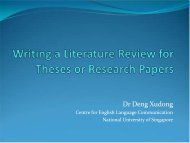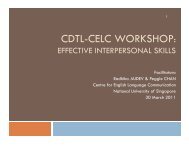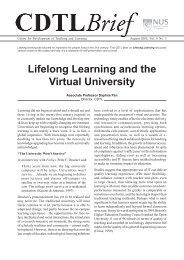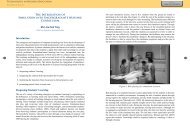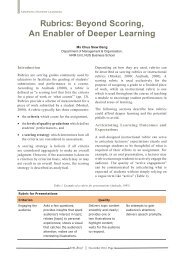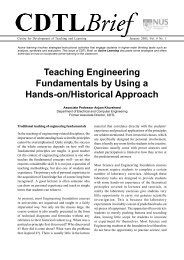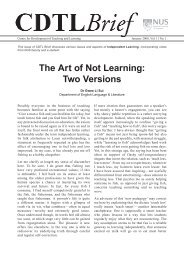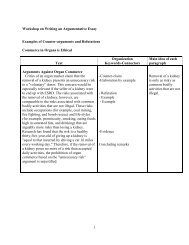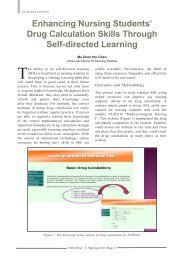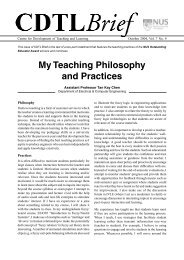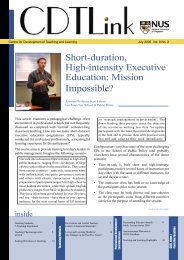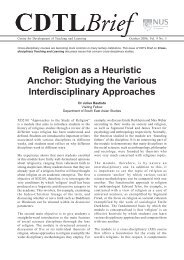January 2011, Vol. 15 No. 1 - CDTL - National University of Singapore
January 2011, Vol. 15 No. 1 - CDTL - National University of Singapore
January 2011, Vol. 15 No. 1 - CDTL - National University of Singapore
Create successful ePaper yourself
Turn your PDF publications into a flip-book with our unique Google optimized e-Paper software.
Centre for Development <strong>of</strong> Teaching and Learning ISSN: 1793-6063 <strong>January</strong>/February <strong>2011</strong> <strong>Vol</strong>. <strong>15</strong> <strong>No</strong>. 1<br />
FEATURE<br />
UTown<br />
12<br />
Foundations Laid,<br />
Relationships Forged<br />
& Networks to Build:<br />
A Year in Outreach<br />
Establishing a Residential<br />
USP<br />
The USP Residential<br />
College: A Faculty<br />
Member’s Perspective<br />
The USP Residential<br />
College: Students’<br />
Perspective<br />
NEWS HIGHLIGHTS<br />
Educator-in-Residence<br />
Programme 2010<br />
In conversation with<br />
Pr<strong>of</strong> Daniel Bernstein<br />
Dialogue Session with<br />
Graduate Students<br />
<strong>CDTL</strong> News<br />
Engaging Learners<br />
14<br />
16<br />
17<br />
4<br />
8<br />
11<br />
19<br />
Enhancing Education<br />
Dear colleagues,<br />
Assoc Pr<strong>of</strong> Chng Huang Hoon<br />
Director, <strong>CDTL</strong><br />
On behalf <strong>of</strong> the <strong>CDTL</strong> Team, allow me to convey New Year greetings to all <strong>of</strong> you, and<br />
thank you most sincerely for your wonderful support for the year that just passed us by. It<br />
is no understatement to say that everything we do at <strong>CDTL</strong> will not be meaningful without<br />
your support and participation in every initiative we collectively worked at from this<br />
platform. Your kind encouragement has served as the major motivating force that powers<br />
all our efforts – THANK YOU!<br />
It seems like only yesterday that I first started working at <strong>CDTL</strong>, but a swift two and a half<br />
years have flown by! <strong>No</strong>w that I have worked through almost 3 full cycles in the <strong>CDTL</strong> year,<br />
I can be a little more reflective and take stock <strong>of</strong> what I have tried to do from this platform.<br />
In the <strong>January</strong> 2009 issue <strong>of</strong> <strong>CDTL</strong>ink, I shared my wish list in “Extending <strong>CDTL</strong>’s Mission”,<br />
and these are to institute a visiting educator programme, to further develop <strong>CDTL</strong>’s Student<br />
Workshop Series and to have <strong>CDTL</strong> Brief develop into <strong>CDTL</strong> Brief Online.<br />
In the <strong>January</strong> 2010 issue, I focused on “<strong>CDTL</strong>: Your Partner in Teaching and Learning<br />
in 2010”, sharing the work that my team put in for that year, including working on both<br />
<strong>University</strong> Town and matters relating to student centricity as well as the support we gave<br />
to the newly established NUS Teaching Academy. We also saw a higher volume in the<br />
Teaching Enhancement Grant (TEG) applications in 2010, with more and more colleagues<br />
competing for TEG funds for education-related projects. In 2010, we extended the TEG in<br />
two ways – to fund longer term projects with higher grant quantum <strong>of</strong> up to $25,000 and to<br />
create an avenue for colleagues to participate in education conferences through our education<br />
conference support travel grant. Both these new extensions were well taken up this year.<br />
Importantly, in 2010, we also focused on two other additional efforts in both internal and<br />
external outreach. One, we introduced a new staff outreach series called simply “The <strong>CDTL</strong><br />
Luncheon Series”. This is a lunch chat series with small groups <strong>of</strong> colleagues engaged in a<br />
pertinent topic <strong>of</strong> discussion. Two, we saw the fruition <strong>of</strong> the visiting educator programme<br />
planned for in 2009 – <strong>CDTL</strong>’s first Educator-in-Residence, Pr<strong>of</strong>essor Daniel Bernstein <strong>of</strong><br />
the <strong>University</strong> <strong>of</strong> Kansas spent 5 weeks with us and shared his expertise through various<br />
formal and informal platforms.<br />
<strong>No</strong>w that <strong>2011</strong> has rolled in, it is time to present a little “report card” on all the above<br />
initiatives.<br />
continued on page 2<br />
Engaging Learners | Enhancing Education 1
MESSAGE<br />
The Educator-in-Residence Programme (EiRP) has<br />
received very enthusiastic support from both colleagues<br />
and students, and from the visitor himself. I have<br />
received feedback and encouragement to develop this<br />
initiative further in the years to come.<br />
Student workshops in the last two years have grown<br />
both in terms <strong>of</strong> the number <strong>of</strong> workshops <strong>of</strong>fered (from<br />
39 workshops in 2009 to 53 in 2010) and in terms <strong>of</strong><br />
student participation rate (from 1014 students in 2009<br />
to 1460 students in 2010).<br />
8 issues <strong>of</strong> <strong>CDTL</strong> Brief brought out between 2009 and<br />
2010 were presented as online issues, with at least 2<br />
special-topic issues showcasing “Freshmen Seminar”<br />
and “Communication Skills” published during this<br />
period.<br />
I am also happy to share that under the leadership <strong>of</strong> Pr<strong>of</strong><br />
Tan Thiam Soon and Pr<strong>of</strong> Tan Tai Yong and together<br />
with the help <strong>of</strong> 4 colleagues – Chui Wai Keung, Ingrid<br />
Ho<strong>of</strong>d, Patrick Daly and Dieter Wilhelm, <strong>CDTL</strong>’s<br />
contribution to the <strong>University</strong> Town curriculum (in the<br />
form <strong>of</strong> a multidisciplinary senior seminar) between late<br />
2008 and early 2010 has been successfully completed.<br />
In this past year, we also worked with Vice Provost<br />
(Student Life), Pr<strong>of</strong> Tan Tai Yong on issues relating to<br />
student life. To this end, we held several discussions<br />
with different stakeholders to find ways to enhance<br />
NUS’ student-centric culture. <strong>CDTL</strong> is proud to be<br />
a partner in helping to develop this student friendly<br />
climate.<br />
The <strong>CDTL</strong> Luncheon Series, started in Semester 1 <strong>of</strong><br />
2009/2010 is an outreach platform to engage small<br />
groups <strong>of</strong> colleagues in conversations about education.<br />
This lunch chat series has served well in bringing<br />
colleagues together for some good conversations about<br />
education in NUS.<br />
In addition to realising all the above plans, <strong>CDTL</strong> also<br />
undertook one more new initiative in 2010 – the able<br />
communicator project. We are working with CELC and<br />
also developing our own resources within <strong>CDTL</strong> to help<br />
to enhance the communication skills <strong>of</strong> our students. To<br />
achieve this, <strong>CDTL</strong> has undertaken steps to develop a<br />
communication skill series for our students, to be launched<br />
within the first quarter <strong>of</strong> <strong>2011</strong>. Our communication skills<br />
instructor, Ms Shen Chi, has started work at <strong>CDTL</strong> from<br />
1 <strong>No</strong>vember 2010, and is deep in planning for the <strong>2011</strong><br />
Communication Skills Student Workshop Series. Please<br />
help us to encourage your students to actively participate<br />
in this workshop series.<br />
<strong>2011</strong> therefore promises to be an even busier year, with<br />
the above programmes to be further developed and new<br />
challenges to meet. The focus for <strong>2011</strong>, as the title <strong>of</strong> this<br />
New<br />
Student Workshop Series:<br />
Communication Skills<br />
“The focus for <strong>2011</strong> ... will be to build on<br />
the foundations laid and to venture into<br />
developing our various outreach efforts<br />
• <strong>CDTL</strong> Luncheon Series<br />
• EiRP Development<br />
• TLHE <strong>2011</strong><br />
• Networking with peer institutions”<br />
message suggests, will be to build on the foundations laid<br />
and to venture into developing our various outreach efforts.<br />
Internal Outreach<br />
<strong>CDTL</strong> Luncheon Series<br />
To date, we have seen 3 sets <strong>of</strong> colleagues at <strong>CDTL</strong><br />
engaged in lunch chats on the following 3 topics –<br />
enhancing the student’s varsity experience, developing<br />
good communication skills among NUS students and the<br />
issues surrounding the external validation <strong>of</strong> teaching.<br />
Given the level <strong>of</strong> positive engagement at these luncheons,<br />
we anticipate continuing with this initiative for some time<br />
to come.<br />
EiRP development<br />
The EiRP is both an internal and an external outreach<br />
platform. With the warm reception <strong>of</strong> the Inaugural<br />
Educator-in-Residence, Pr<strong>of</strong>essor Daniel Bernstein, <strong>CDTL</strong><br />
looks forward to developing this scheme further, and there<br />
is already talk <strong>of</strong> an EiRP Alumni Circle for the future! As<br />
we speak, follow-ups arising from the first visit are in the<br />
works, even as we plan for the second visitor to come to<br />
<strong>CDTL</strong>. We take this opportunity to thank all colleagues<br />
and students for the interest shown and would like to invite<br />
feedback and input to help us make the second visit an even<br />
more enriching one for everyone in NUS.<br />
External Outreach<br />
TLHE <strong>2011</strong><br />
<strong>CDTL</strong> has hosted 5 successful conferences on Teaching and<br />
Learning in Higher Education (TLHE) since 2000. The 6 th<br />
TLHE will be held in early December <strong>2011</strong>, and we have<br />
plans to make it markedly different from previous TLHEs<br />
in terms <strong>of</strong> structure, and student involvement with more<br />
emphasis on hands-on workshops. When plans are more<br />
2 Engaging Learners | Enhancing Education
MESSAGE<br />
concrete, we will share the conference details with all<br />
colleagues. TLHE <strong>2011</strong> will extend <strong>CDTL</strong>’s reach further<br />
by not just bringing together old friends and established<br />
partners, but to forge new links and pr<strong>of</strong>essional contacts<br />
and enable even more productive exchanges.<br />
Networking with peer institutions<br />
Over the years, <strong>CDTL</strong> has built up a reputation globally as<br />
a place where people gather for pedagogical exchanges on<br />
a range <strong>of</strong> <strong>CDTL</strong> platforms. <strong>CDTL</strong> is now well positioned<br />
to build up a network <strong>of</strong> external partners for teaching<br />
exchanges, pedagogical research collaborations and sharing<br />
<strong>of</strong> expertise, including our online resources. We believe<br />
that by cultivating partnerships with our peer institutions<br />
and educators abroad, we will enhance <strong>CDTL</strong>’s capacity<br />
and in the process, bring about both tangible and intangible<br />
benefits to NUS colleagues.<br />
I hope you are as energised and excited by all the above<br />
developments as my team is. The <strong>CDTL</strong> team will continue<br />
to engage you on the above platforms and will constantly<br />
seek to establish new ways <strong>of</strong> engagement. We hope to have<br />
you join us in whatever capacity you wish to be involved<br />
and look forward to seeing you at <strong>CDTL</strong> events in <strong>2011</strong>.<br />
Happy New Year, everyone!<br />
Take care,<br />
Huang Hoon and the <strong>CDTL</strong> Team<br />
STAFF ANNOUNCEMENTS<br />
Ms Chichi C. SHEN<br />
Instructor <strong>of</strong><br />
Communication Skills,<br />
<strong>CDTL</strong><br />
A Warm Welcome to Shen Chi!<br />
Shen Chi joined our team on 1 <strong>No</strong>vember 2010.<br />
Prior to joining <strong>CDTL</strong>, Shen Chi was a full-time lecturer teaching Academic English in<br />
the Writing Centre, <strong>National</strong> Chiao Tung <strong>University</strong>, Taiwan.<br />
Shen Chi graduated from the <strong>National</strong> Taiwan <strong>University</strong> with a major in Foreign<br />
Languages and Literatures. She received her MA in English from the <strong>University</strong> <strong>of</strong> York.<br />
She also holds the accredited CELTA (Certificate in Teaching English Language to Adults)<br />
and BEC Higher (Business English Certificate) from Cambridge ESOL.<br />
Her general interest is in promoting good reading – for the benefit <strong>of</strong> readers as well as<br />
publishers. Her long-term partnership with a publishing representative in good repute<br />
has shaped her self-view as a multibridge for authors, publishers, and the reading public.<br />
She believes when readers are educated to be critical and selective, they can become<br />
the support or driving force behind the publishing business, consequently encouraging<br />
authors and publishers to produce more quality and challenging contents for reading.<br />
She will be conducting <strong>CDTL</strong>’s Student Workshop Series on Communication Skills.<br />
A Big Thank You to Shin Dee!<br />
Shin Dee who was Editor <strong>of</strong> <strong>CDTL</strong>ink for the last 3 years will be moving on to focus on<br />
other <strong>CDTL</strong> publications.<br />
If you have any feedback or would like to contribute articles, please contact: Bee Choon<br />
email: cdtybc@nus.edu.sg • Tel: (65) 6516 8047<br />
We look forward to your continued support.<br />
Engaging Learners | Enhancing Education<br />
3
EiRP 2010<br />
Educator-in-Residence Programme (EiRP) 2010<br />
The EiRP is a new <strong>CDTL</strong> initiative that<br />
provides a platform for distinguished educators<br />
to visit NUS to share their expertise with<br />
the faculty and student community through<br />
a range <strong>of</strong> activities such as public lectures,<br />
teaching seminars, staff and student workshops,<br />
formal and informal meetings/discussions and<br />
individual/group consultations.<br />
The objectives <strong>of</strong> the EiRP are:<br />
To facilitate the exchange <strong>of</strong> ideas, expertise<br />
and perspectives in education, policies,<br />
pedagogy and innovations with NUS<br />
faculty members, Teaching Academy<br />
Fellows and the <strong>University</strong> Administration;<br />
To engage the NUS community in teaching<br />
and learning issues to promote teaching<br />
excellence and student learning; and<br />
To provide opportunities for possible<br />
institutional link-ups for research<br />
collaborations, study trips and pr<strong>of</strong>essional<br />
exchanges.<br />
Pr<strong>of</strong>essor Daniel Bernstein was <strong>CDTL</strong>’s first<br />
Educator-in-Residence. He is the Director <strong>of</strong><br />
the Center for Teaching Excellence and also<br />
a Pr<strong>of</strong>essor in the Department <strong>of</strong> Psychology,<br />
<strong>University</strong> <strong>of</strong> Kansas. Pr<strong>of</strong> Bernstein has<br />
published extensive work on the evaluation <strong>of</strong><br />
teaching, particularly in the areas <strong>of</strong> peer review<br />
<strong>of</strong> teaching and course portfolios.<br />
Pr<strong>of</strong> Bernstein visited <strong>CDTL</strong>/NUS from 13<br />
September-<strong>15</strong> October 2010. During the 5-week<br />
period, he was engaged in a host <strong>of</strong> activities<br />
with the <strong>CDTL</strong> Team, the NUS Teaching<br />
Academy, faculty members and students.<br />
Main Highlights<br />
• Public Lecture, 28 Sep 2010<br />
The lecture titled “Trends in Higher<br />
Education: How can we stay ahead<br />
(or even keep up)” was held at<br />
the <strong>University</strong> Auditorium. Pr<strong>of</strong><br />
Bernstein provided insights on how<br />
universities can constructively respond<br />
to challenges as a result <strong>of</strong> influences<br />
or changes in instructional practice,<br />
education policy and public opinion in<br />
education. This lecture is available at<br />
http://www.cdtl.nus.edu.sg/global/eirp-public-lecture.htm<br />
NUS Provost, Pr<strong>of</strong> Tan Eng Chye presenting Pr<strong>of</strong> Bernstein<br />
with the gift <strong>of</strong> “xue”<br />
4Artist: Dr. Engaging Ho Chee Learners Lick | Enhancing Education<br />
L-R: A/P Chng Huang Hoon, Pr<strong>of</strong> Tan Eng Chye, Pr<strong>of</strong> Dan Bernstein,<br />
Pr<strong>of</strong> Tan Thiam Soon, Pr<strong>of</strong> Bernard Tan, A/P Laksh Samavedham, A/P Daphne Pan
EiRP 2010<br />
• Faculty Dialogue, 9 Oct 2010<br />
About 30 faculty members and 7 students interacted and discussed “Embracing Technology in Education”<br />
at the Dialogue session.<br />
• Teaching Assistant Programme (TAP),<br />
22-23 Sep 2010<br />
Pr<strong>of</strong> Bernstein delivered a plenary session titled<br />
“Motivating students through engaged learning and<br />
authentic assessment” to 49 Teaching Assistants (22<br />
September) and facilitated a microteaching session<br />
(23 September).<br />
• Student Workshop, 7 Oct 2010<br />
The workshop on “Graduating into the 21 st century workplace: Essential skills for an uncertain world” was<br />
held at Lecture Theatre 4, NUS. In this interactive session, Pr<strong>of</strong> Bernstein highlighted the kind <strong>of</strong> thinking<br />
and perspectives required in today’s employment and multicultural work environment. This workshop is<br />
available for viewing on NUScast at http://www.cdtl.nus.edu.sg/global/eirp-stud-wkshop.htm.<br />
Engaging Learners | Enhancing Education<br />
5
EiRP 2010<br />
• Sharing <strong>of</strong> Expertise with <strong>CDTL</strong><br />
<strong>CDTL</strong> team had several discussions with Pr<strong>of</strong> Bernstein on various pedagogy issues and<br />
organisational matters.<br />
• Discussion with Provost Office, 17 Sep 2010<br />
Pr<strong>of</strong> Bernstein had discussion with Pr<strong>of</strong> Tan Eng Chye, NUS Provost; Pr<strong>of</strong> Tan Thiam Soon, Vice-<br />
Provost (Education); Pr<strong>of</strong> Tan Tai Yong, Vice-Provost (Student Life); Pr<strong>of</strong> Daniel Chan, Assoc<br />
Provost (Graduate Education); Pr<strong>of</strong> Bernard Tan, Assoc Provost (Undergraduate Education);<br />
A/Pr<strong>of</strong> Chng Huang Hoon, Director; and A/Pr<strong>of</strong> Laksh Samavedham, Deputy Director, <strong>CDTL</strong> on<br />
education policies.<br />
• Engaging NUS Faculty Members<br />
Pr<strong>of</strong> Bernstein held several discussions with NUS faculty members from various departments on<br />
education and teaching or learning issues.<br />
• Teaching Seminars and Discussions with NUS Departments<br />
Item<br />
Department <strong>of</strong> Psychological Medicine<br />
29 Sep 2010<br />
Department <strong>of</strong> Electrical and Computer<br />
Engineering<br />
30 Sep 2010<br />
Departments <strong>of</strong> Real Estate and Building<br />
13 Oct 2010<br />
Centre for English Language Communication<br />
13 Oct 2010<br />
Description<br />
Pr<strong>of</strong> Bernstein conducted a small group teaching session on<br />
“training the trainer” for about 40 staff, comprising doctors, psychologists<br />
and nurses.<br />
The focus <strong>of</strong> the discussion with the ECE Academic Committee<br />
was on how to measure teaching performance.<br />
Pr<strong>of</strong> Bernstein conducted a teaching seminar on course planning<br />
and use <strong>of</strong> technology in class for about 20 staff and graduate<br />
students.<br />
Pr<strong>of</strong> Bernstein was invited to be one <strong>of</strong> the members for the Panel<br />
Discussion on Academic Writing across the Disciplines. The<br />
session was convened by the Pedagogical Research and Seminars<br />
Committee/CELC<br />
• Meetings with NUS Teaching Academy<br />
The NUS Teaching Academy held several meetings with Pr<strong>of</strong> Bernstein. He was invited to attend<br />
their regular meetings and activities such as the Teaching Academy Exco meeting, the Teaching<br />
and Learning Club outreach activity, E-journal subcommittee, Student Feedback and Peer Review<br />
meetings.<br />
6 Engaging Learners | Enhancing Education
EiRP 2010<br />
• 3 rd <strong>CDTL</strong> Luncheon Series, 8 Oct 2010<br />
The group<br />
comprising<br />
17 faculty<br />
members<br />
from various<br />
departments<br />
discussed<br />
issues<br />
pertaining<br />
to External<br />
Validation <strong>of</strong><br />
Teaching<br />
L-R: Dr. Ho Han Kiat, Pr<strong>of</strong> Tan Thiam Soon, Pr<strong>of</strong> Bernstein<br />
• Farewell Lunch, 14 Oct 2010<br />
L-R: Dr Ang Eng Tat, Pr<strong>of</strong> Daniel Bernstein, A/P Chng Huang<br />
Hoon, Pr<strong>of</strong> John Richardson, Dr Ben Leong<br />
L-R: Dr Lee Hon Sing, Pr<strong>of</strong> Daniel Bernstein, A/P Laksh<br />
Samavedham, A/P Frank Voon Chee Tet<br />
Pr<strong>of</strong> Daniel Bernstein with <strong>CDTL</strong> team and guests<br />
Engaging Learners | Enhancing Education<br />
7
EiRP 2010<br />
Educator-in-Residence Programme<br />
(EiRP) 2010:<br />
In Conversation with Pr<strong>of</strong>essor Daniel Bernstein<br />
learning. We <strong>of</strong>fer workshops, we facilitate conversations<br />
among teachers, and we provide a community for public<br />
consideration <strong>of</strong> teaching and learning. Our signature<br />
activity is the generation <strong>of</strong> electronic portfolios in which<br />
faculty members present their teaching practices, their<br />
students’ work, and their description <strong>of</strong> what they have<br />
learned about teaching from working with students. We<br />
hope that our community <strong>of</strong> visible conversation around<br />
learning will have the same intellectual energy and quality<br />
that is typically found around the research and scholarship<br />
<strong>of</strong> our faculty colleagues.<br />
<strong>CDTL</strong>ink caught up with Pr<strong>of</strong>essor Bernstein to find out<br />
his thoughts on teaching and learning related issues that<br />
were addressed during his time in NUS .<br />
Welcome to <strong>Singapore</strong> and to NUS, Pr<strong>of</strong>essor Bernstein!<br />
Could you tell us a little about your work as Director<br />
<strong>of</strong> the Center for Teaching Excellence at <strong>University</strong> <strong>of</strong><br />
Kansas (KU)<br />
Our centre is organised around a simple idea; teaching<br />
should be a continuous inquiry into what procedures<br />
and conditions help students learn the best they can. An<br />
excellent teacher is someone who learns from the quality<br />
<strong>of</strong> students’ work. When students do well, the teacher<br />
continues those practices, but when students struggle to<br />
learn, an excellent teacher tries to discover better ways to<br />
prepare students and help them achieve. So, we do many<br />
things to assist our colleagues in that inquiry into student<br />
In your conversations with NUS colleagues these past<br />
few weeks, what have been the most keenly discussed<br />
teaching and learning issue(s)<br />
One issue that came up a lot is the development <strong>of</strong><br />
creativity and originality in students’ academic work. NUS<br />
faculty have great praise for their students’ diligence and<br />
preparation, and we all see that energy and commitment<br />
as an asset. Our definition <strong>of</strong> understanding in a field,<br />
however, usually includes some ability to use what has been<br />
learned in ways that were not explicitly taught, and some<br />
faculty members feel they are only successful in helping<br />
students remember what has been taught. They would like<br />
to find ways to develop a broader and more independent<br />
understanding that includes new applications and creative<br />
uses <strong>of</strong> the ideas found in their courses.<br />
Another issue centres around the use <strong>of</strong> class time; many<br />
conversations focused on the value <strong>of</strong> direct lecturing by<br />
pr<strong>of</strong>essors and whether it is the best way to teach. Certainly<br />
there are times when a lecture is a good teaching tool, most<br />
especially when students already know a lot about a field.<br />
When a faculty member lectures on her or his integrated and<br />
synthesized understanding <strong>of</strong> a field, however, that typically<br />
does not translate into deep understanding by students. The<br />
students can repeat what the pr<strong>of</strong>essor said, but they likely<br />
cannot use those ideas in new ways. So in a sense, the<br />
conversation about lectures is related to the conversation<br />
about generating a deep understanding in students. Lectures<br />
“An excellent teacher is someone who learns from the quality <strong>of</strong> students’ work. When students<br />
do well, the teacher continues those practices, but when students struggle to learn, an excellent<br />
teacher tries to discover better ways to prepare students and help them achieve.”<br />
8 Engaging Learners | Enhancing Education
EiRP 2010<br />
“... we must first think <strong>of</strong> teaching as<br />
serious intellectual work, not simply as a<br />
routine delivery <strong>of</strong> knowledge.”<br />
work well in some contexts, but many pr<strong>of</strong>essors find that<br />
lecturing is less effective in helping beginning students<br />
acquire a flexible understanding <strong>of</strong> course ideas. Much <strong>of</strong><br />
our conversation was spent talking about alternatives to<br />
direct lecturing, mostly in discussing practical methods <strong>of</strong><br />
having useful interactions in large classes.<br />
Are these issues similar (or different) to the teaching<br />
and learning issues that your colleagues face at KU<br />
These issues are very similar to what we discuss. Lecturing<br />
is the main way that faculty members have taught for<br />
centuries, and it is challenging to reconsider this method in<br />
new ways. So we also look for practical ways to encourage<br />
students to apply concepts to new problems. Our university,<br />
like NUS, has many classrooms that are large lecture<br />
theatres, and more planning is required to allow students<br />
in such a setting to have meaningful interactions.<br />
One way that our students are different is that some <strong>of</strong> them<br />
are not very diligent about their studies. I admire the way<br />
that NUS students do their academic work outside <strong>of</strong> class,<br />
and I tried to learn what I could about how and why that is<br />
typical in <strong>Singapore</strong>. Our goal is for students to use ideas<br />
and practice application to new contexts, but that work<br />
can only be done if students come to class having done<br />
the assigned reading and writing. We spend a lot <strong>of</strong> our<br />
conversations at KU exploring ways to motivate students<br />
to come to class ready to use what they have been asked<br />
to read.<br />
You strongly advocate that an essential part <strong>of</strong><br />
excellence in teaching includes providing a culture and<br />
environment in which faculty members can represent<br />
the intellectual work they do in teaching. Could you tell<br />
us more about this<br />
The key idea is that we must first think <strong>of</strong> teaching as<br />
serious intellectual work, not simply as a routine delivery<br />
<strong>of</strong> knowledge. It is not enough for me to plan a clear<br />
presentation that makes available my own understanding<br />
<strong>of</strong> my field; I need to demonstrate that my students have<br />
acquired an understanding <strong>of</strong> the field through their<br />
experiences in my module. That is a more demanding<br />
intellectual task than simply organising some lectures and<br />
giving them in a clear fashion.<br />
All forms <strong>of</strong> intellectual work are made publicly visible<br />
to other scholars, and that process has many advantages.<br />
When work is public it can be used by others engaged in the<br />
same field, and in some cases those people will build upon<br />
that work and develop the ideas and evidence further. In<br />
addition, other scholars can examine, analyse, and possibly<br />
criticise public work. Such a marketplace <strong>of</strong> ideas with<br />
constant critical feedback is essential to the continuous<br />
development and evolution <strong>of</strong> intellectual work, and the<br />
universality <strong>of</strong> peer review <strong>of</strong> scholarship indicates that a<br />
critical community is valuable to academic progress. Since<br />
we consider teaching to be more than just a performance <strong>of</strong><br />
knowledge, but an act <strong>of</strong> intellectual inquiry in its own right,<br />
it is essential that we make our teaching and our students’<br />
learning visible to our colleagues for their consideration.<br />
They may imitate our methods in hope <strong>of</strong> getting similar<br />
results, they may further develop our methods in new ways,<br />
and they may point out flaws in what we have done or in<br />
how we write about it. In all those cases, we participate in<br />
a community <strong>of</strong> scholars whose focus is on the discovery<br />
<strong>of</strong> the best ways to help students learn deeply. In our centre,<br />
we create a virtual community in which faculty members<br />
make their teaching and their students’ learning visible for<br />
all to see and to comment on.<br />
Let’s turn our attention to technology-enabled learning,<br />
which you have highlighted as being a key component<br />
in effective teaching. How can we do more to enable<br />
and encourage more faculty members to incorporate<br />
technology-enabled learning into their curricula<br />
It is not easy to convince faculty members to add<br />
technological tools to their set <strong>of</strong> teaching skills; learning<br />
to use new tools takes time and energy, and both <strong>of</strong> those<br />
are in short supply in any modern university. We try two<br />
approaches to engaging faculty colleagues in that task <strong>of</strong><br />
acquiring and implementing new technology skills.<br />
First, we appeal to their genuine interest in having students<br />
learn their field. There are many studies that demonstrate<br />
how well students benefit from individual interactions with<br />
technological teaching environments. We read those studies,<br />
talk about them, and ask faculty members if they would<br />
like their students to use time outside <strong>of</strong> class to acquire<br />
content. If so, we make technological tools available to<br />
them, either generic programmes they can fill with their<br />
own content or pre-prepared materials that cover general<br />
topics in their field.<br />
Second, I ask them what teaching activities take the most<br />
time; when I know what those are, I ask which ones they<br />
would most like to be rid <strong>of</strong>. Whenever possible, I suggest<br />
that they be liberated from those chores in teaching that are<br />
least enjoyable, and we propose substituting something that<br />
the pr<strong>of</strong>essor enjoys more. If there are interesting face-to-<br />
Engaging Learners | Enhancing Education<br />
9
EiRP 2010<br />
face teaching activities that a pr<strong>of</strong>essor enjoys, we can make<br />
time for those by replacing a less enjoyable activity that can<br />
be handled (as well or better) by an automated programme<br />
<strong>of</strong> instruction. Once faculty members experience the<br />
benefits <strong>of</strong> technology, it is easier to invite them to try the<br />
more exotic and complex versions that are available. The<br />
bottom line in this strategy is that technology can take<br />
on a variety <strong>of</strong> functions that are standardised and <strong>of</strong>ten<br />
repetitive, allowing the pr<strong>of</strong>essor the freedom to engage<br />
students in more interesting ways that are difficult to do<br />
with computers.<br />
You had the opportunity to engage in active dialogue<br />
with our students through the student workshop<br />
you conducted on 7 October 2010 and our Teaching<br />
Assistants Programme (TAP) this semester. What has<br />
been your observation in terms <strong>of</strong> the teaching and<br />
learning issues that our students and graduate student<br />
TAs face<br />
From the students’ perspective, the biggest challenge is to<br />
identify modules or other experiences that will allow the<br />
development <strong>of</strong> independent scholarship and academic<br />
creativity. While a foundation <strong>of</strong> knowledge (simply<br />
remembering things) is useful, the real benefit from an<br />
education is the ability to respond to and deal with issues,<br />
situations, or problems you have not seen before. One <strong>of</strong><br />
the hardest things a student has to learn is how to recognise<br />
what knowledge and skills he or she already has that are<br />
relevant in new contexts. If you have only taken modules<br />
or programmes that train specific or particular responses<br />
to predictable situations, you will be at a disadvantage.<br />
Students need to select those opportunities that challenge<br />
and stretch them, calling for new uses <strong>of</strong> old ideas and<br />
information.<br />
From the TA perspective, the biggest challenge is to become<br />
comfortable with learning from your own teaching. Every<br />
time you plan and deliver a module, you are doing an<br />
experiment in learning. Your students are learning, and you<br />
need to carefully examine that learning to find out what your<br />
module did well and where it had weaker impact. This is<br />
hard to do, in part because you will want to feel good about<br />
your work, and it can be unpleasant to acknowledge there<br />
is room for improvement. On the other hand, it is exciting<br />
and engaging to have a puzzle or problem to solve, and<br />
there will always be levels <strong>of</strong> learning that are beyond your<br />
students. After 35 years <strong>of</strong> teaching, I am still discovering<br />
new ways to improve every time I teach. You can spend a<br />
happy career as a teacher trying to help more students reach<br />
higher levels <strong>of</strong> understanding. But to do that, you need to<br />
see yourself as learning about teaching by looking at what<br />
your students did and did not learn.<br />
One final question. During your student workshop, you<br />
outlined the essential skills students need to navigate<br />
the uncertain work world that they will enter once they<br />
graduate. As educators, what part can we play in helping<br />
them acquire these skills<br />
This is a very good question, and there is not a single or a<br />
simple answer. It is hard to know the future, so we can never<br />
be sure we know about the world we prepare our students<br />
for. Still, there is a basic frame <strong>of</strong> reference that may help<br />
in this regard. Within any module there is a fixed amount<br />
<strong>of</strong> time and a limit to the amount <strong>of</strong> studying and writing<br />
that students can do. When allocating that time we need to<br />
consider the balance between covering the content that we<br />
as scholars value and giving students a chance to discover<br />
(or uncover for themselves) how we use what we know in<br />
addressing new issues. I return to my earlier claim that a<br />
deep understanding includes being able to use what you<br />
know in ways that were not taught to you. It is hard, but we<br />
need to make space in our modules for students to practise<br />
using their knowledge and practise the tools <strong>of</strong> discovery in<br />
our field. We need to give them ill-structured problems that<br />
are not familiar in form and allow them the time to make<br />
mistakes and recover from them. This is very hard to do<br />
because it is easy to make problems that are just too hard<br />
and beyond their reach. A developmental theorist named<br />
Vygotsky identified a zone <strong>of</strong> proximal development – that<br />
space in which the challenges <strong>of</strong> life are neither too easy nor<br />
too hard to be useful. If as teachers we make room within<br />
the delivery <strong>of</strong> content for students to encounter that zone,<br />
to struggle a bit with application <strong>of</strong> their understanding,<br />
then we may be preparing them for comparable situations<br />
in life and in work.<br />
Thank you for taking time <strong>of</strong>f from your busy schedule to<br />
talk to us, Pr<strong>of</strong>essor Bernstein!<br />
10 Engaging Learners | Enhancing Education
<strong>CDTL</strong> DIALOGUE SERIES<br />
Dialogue Session with Graduate Students<br />
Working on your thesis: How to get started, and how to keep it going<br />
Left: A/P Sow Chorng<br />
Haur at the Faculty <strong>of</strong><br />
Science dialogue session<br />
on 1 September 2010.<br />
Right: A/P Laksh<br />
Samavedham discussing<br />
with students at the<br />
Faculty <strong>of</strong> Engineering<br />
dialogue session on<br />
25 August 2010.<br />
Gaining i a Masters or Doctoral degree via<br />
research involves the use <strong>of</strong> both domain<br />
dependent skills and generic skills. While<br />
individual research supervisors may be able<br />
to teach all these skills to their students, one<br />
can foresee the varying levels <strong>of</strong> students’<br />
awareness <strong>of</strong> these generic skills. Students<br />
normally find asking themselves questions at<br />
different stages <strong>of</strong> their work: for example,<br />
“Where, and how, do I start”, “How do I go<br />
about selecting the research topic and framing<br />
the research questions”, “What if my plans<br />
go wrong How do I cope with failure and<br />
still stay motivated to complete my degree”,<br />
“What habits and good practices should I<br />
adopt to make my thesis writing a less-painful<br />
experience” and “What would examiners look<br />
for at my final PhD defense” <strong>No</strong>t all students<br />
are able to find answers to these questions easily<br />
or naturally and yet these are important issues<br />
for them to deal with. In this context, <strong>CDTL</strong><br />
held a dialogue session in March 2010 to engage<br />
graduate students on these issues. We are,<br />
however, fully aware that one session cannot<br />
answer (or even surface) all the issues that any<br />
student may encounter – but a start needed to<br />
be made somewhere. <strong>CDTL</strong> sees these kinds<br />
<strong>of</strong> dialogue sessions as important contributions<br />
to the recent initiatives that are being put in<br />
place to further enhance the graduate education<br />
experience at NUS.<br />
About 120 NUS graduate students, most <strong>of</strong><br />
them enrolled in PhD programmes, were<br />
engaged by six faculty members from across<br />
the <strong>University</strong> in these dialogue sessions.<br />
While the original idea was to have a single<br />
session with a panel <strong>of</strong> three faculty members<br />
addressing the issues and answering questions<br />
from the participants, the audience size <strong>of</strong> 120<br />
made the idea <strong>of</strong> a dialogue not so feasible. It<br />
was also felt that the research processes and<br />
issues surrounding the research work can vary<br />
significantly between the different disciplines<br />
and; the faculty members involved felt that<br />
students can better benefit from faculty/schoolspecific<br />
sessions. Therefore, the original<br />
dialogue session evolved into seven segments<br />
– one each for FASS, FoS, SoC, YLLSoM, and<br />
SDE and two for the FoE (as there were more<br />
registrants from this Faculty). Each <strong>of</strong> these<br />
segments was handled by faculty members from<br />
the respective Faculty/School. The emphasis<br />
was on hearing from the participants; use<br />
the experience <strong>of</strong> faculty members and other<br />
participants to suggest ways <strong>of</strong> dealing/coping<br />
with the different issues; and to bring to their<br />
attention useful resources available through<br />
various media.<br />
There was enthusiastic participation from the<br />
students at each <strong>of</strong> these sessions. Several<br />
thoughtful comments and practical issues<br />
surfaced from the students which provided<br />
some useful feedback for the facilitators to<br />
follow-up on in future sessions. Overall, it<br />
was a productive endeavour for the students<br />
and the faculty involved. Come <strong>2011</strong>, <strong>CDTL</strong><br />
hopes to organise a focused workshop/seminar<br />
series that will provide our graduate student<br />
community an opportunity to hone the generic<br />
skills needed for success in their research.<br />
We welcome colleagues from the various<br />
departments who may have interest in helping<br />
to facilitate such future sessions. Write or call<br />
us at <strong>CDTL</strong>.<br />
A/P Lakshminarayanan Samavedham<br />
Engaging Learners | Enhancing Education<br />
11
FEATURE<br />
<strong>University</strong> Town (UTown)<br />
<strong>University</strong><br />
Town (UTown)<br />
is one <strong>of</strong> NUS’<br />
key strategic<br />
initiatives, where<br />
there will be<br />
substantive<br />
qualitative<br />
enhancement<br />
to the overall<br />
NUS educational<br />
experience and<br />
reflects NUS’<br />
commitment to<br />
collaborative<br />
and multidisciplinary<br />
learning.<br />
Two key<br />
components <strong>of</strong><br />
UTown:<br />
• A college<br />
system<br />
incorporating<br />
residential<br />
learning<br />
• A mix <strong>of</strong> social,<br />
recreational,<br />
sporting and<br />
enterpriserelated<br />
facilities and<br />
activities<br />
Pictures are artists’ impression only and information is accurate at the time <strong>of</strong> printing.<br />
Located across the NUS Kent Ridge campus,<br />
UTown will redefine the way how people<br />
live and learn on campus. It combines the<br />
convenience <strong>of</strong> campus living with an exciting<br />
multidisciplinary academic programme.<br />
Cutting-edge research facilities such as<br />
the Campus for Research Excellence and<br />
Technological Enterprise (CREATE) will also<br />
be located at UTown.<br />
12 Engaging Learners | Enhancing Education
FEATURE<br />
Its two<br />
Residential<br />
Colleges<br />
(Tembusu and<br />
Cinnamon) and<br />
the Graduate<br />
Residence will<br />
be launched in<br />
August <strong>2011</strong>.<br />
Pr<strong>of</strong>essor Tommy Koh, who is currently<br />
Ambassador-at-Large at the Ministry <strong>of</strong><br />
Foreign Affairs and is also Special Advisor <strong>of</strong><br />
the Institute <strong>of</strong> Policy Studies and Chairman<br />
<strong>of</strong> the <strong>National</strong> Heritage Board, has been<br />
appointed Rector <strong>of</strong> Tembusu College. Pr<strong>of</strong><br />
Koh will be working with College Master Assoc<br />
Pr<strong>of</strong> Gregory Clancey, a scholar specialising<br />
in Japanese history as well as the history <strong>of</strong><br />
Science and Technology.<br />
Pr<strong>of</strong>essor Wang Gungwu, Chairman <strong>of</strong> the East<br />
Asian Institute and NUS <strong>University</strong> Pr<strong>of</strong>essor,<br />
has been appointed Rector <strong>of</strong> Cinnamon<br />
College. The College will house the <strong>University</strong><br />
Scholars Programme (USP). This marks a<br />
milestone for the interdisciplinary programme<br />
as it transforms into a full-fledged College.<br />
Its College Master is John Richardson, USP<br />
Director and Pr<strong>of</strong>essor <strong>of</strong> English Literature.<br />
Pictures are artists’ impression only and information is accurate at the time <strong>of</strong> printing.<br />
Engaging Learners | Enhancing Education<br />
13
FEATURE<br />
Establishing a Residential USP<br />
Pr<strong>of</strong> John Richardson<br />
Director, <strong>University</strong> Scholars Programme &<br />
Master <strong>of</strong> USP residential college<br />
The move to a Residential College in June<br />
<strong>2011</strong> will transform the <strong>University</strong> Scholars<br />
Programme (USP).<br />
For ten years now, the programme has been<br />
<strong>of</strong>fering a complementary education for<br />
students from its six partner faculties. We<br />
take 30% <strong>of</strong> our students’ curriculum and do<br />
two things. First, we help them become more<br />
broadly educated, more capable <strong>of</strong> making<br />
connections, more critical and more articulate.<br />
Second, we provide new perspectives which<br />
enable our students to approach the remainder<br />
<strong>of</strong> the curriculum, their major, differently.<br />
All that will continue and, we hope, grow<br />
stronger. But the strengthening <strong>of</strong> the curriculum<br />
does not represent a sea change, and the future<br />
<strong>of</strong> our formal education will to some extent<br />
be business as usual. What will change most<br />
fundamentally will be the informal education<br />
we <strong>of</strong>fer. This is where the transformation will<br />
occur, and I don’t think “transformation” is too<br />
strong a word. The Residential College will<br />
mean that learning is no longer boxed away into<br />
school times and school places. It will happen<br />
in classes and outside them, during study hours<br />
and beyond them. It will become an integral and<br />
important part <strong>of</strong> our students’ lives.<br />
That change will come about in three main ways<br />
through three sets <strong>of</strong> relationships.<br />
a range <strong>of</strong> such relations. <strong>No</strong>t every teacher<br />
adopts a very teacherly persona, and many<br />
students reject an obedient student’s role. But<br />
given that, the way we arrange our classrooms<br />
and conduct our classes still tends to present the<br />
teacher as the dispenser <strong>of</strong> expert knowledge,<br />
and tends to nudge students towards sitting<br />
(metaphorically) at the teacher’s feet.<br />
The teacher/student relationship in the<br />
Residential College will be more collaborative<br />
than this. Teachers and students will work<br />
together, and be engaged in a common pursuit<br />
<strong>of</strong> knowledge and understanding. A number <strong>of</strong><br />
conditions will ensure this. For one thing, class<br />
enrolments will remain small. For another, the<br />
classrooms will have no podium or focal-point<br />
teacher’s desk; they will be set out conferencestyle<br />
or in islands to encourage discussion and<br />
interaction. Most important <strong>of</strong> all, however,<br />
will be the fact that students and teachers will<br />
meet each other <strong>of</strong>ten in settings outside the<br />
classroom. Eating and relaxing together will<br />
inevitably shift the relationship away from a<br />
purely teacher/student one.<br />
“The<br />
Residential<br />
College will<br />
mean that<br />
learning is no<br />
longer boxed<br />
away into<br />
school times<br />
and school<br />
places. It will<br />
happen in<br />
classes and<br />
outside them,<br />
during study<br />
hours and<br />
beyond them.”<br />
Meeting visitors and<br />
interacting over food<br />
Pr<strong>of</strong> John Richardson<br />
in conversation with<br />
students<br />
Students and Teachers<br />
First, the relations between teachers and<br />
students will change. Of course, there is already<br />
14 Engaging Learners | Enhancing Education
FEATURE<br />
USP students at their<br />
student lounge aka<br />
Chatterbox<br />
Artist’s impression <strong>of</strong> a<br />
theme room in UTown<br />
(picture is accurate at the<br />
time <strong>of</strong> printing)<br />
Students and Students<br />
Second, students will learn a lot from each other.<br />
Again this will build upon what happens already.<br />
USP is quite blessed with space, and some <strong>of</strong> our<br />
spaces are given over to student use. The students<br />
who gather in Chatterbox, their lounge, do so to<br />
study, to relax, and above all, to talk. Much <strong>of</strong> that<br />
talk is intellectual in the broadest sense <strong>of</strong> the word.<br />
It addresses important questions and brings different<br />
perspectives to bear upon them.<br />
The college will have both the physical environment<br />
and the culture to foster even more <strong>of</strong> that kind <strong>of</strong><br />
talk. Our spaces will include study rooms (which are<br />
not classrooms), a dining hall, a large student lounge<br />
downstairs, small lounges on each <strong>of</strong> the residential<br />
floors, and nooks and crannies in all the corridors.<br />
In other words, the buildings will encourage the<br />
students to gather and talk. And the college culture<br />
will reinforce that. There will be non-curricular<br />
lectures on all kinds <strong>of</strong> topics, there will be reading<br />
and writing groups, there will be faculty in the dining<br />
hall with the students. In short, the atmosphere will<br />
be one in which ideas matter and are taken seriously.<br />
Another element in the student mix will be our<br />
Student Exchange Programme (SEP) students. The<br />
college will take in a good number <strong>of</strong> these, and<br />
we’ll be careful both to choose and to induct them<br />
so that they can be fully integrated into college life.<br />
The presence <strong>of</strong> students from different disciplines<br />
already ensures a variety <strong>of</strong> perspectives in USP;<br />
the visiting students from different countries will<br />
add to this.<br />
Students and Others<br />
Finally, students will learn a lot by mixing with a<br />
range <strong>of</strong> different people.<br />
The current USP <strong>of</strong>fice is a model <strong>of</strong> student<br />
centricity. (I can say this because that is what I<br />
found in place when I came here a year ago, so it<br />
is something for which I can take no credit.) The<br />
value <strong>of</strong> our student focus is far greater than simply<br />
giving good service. Students are constantly in and<br />
out <strong>of</strong> the <strong>of</strong>fice, not just to hand in papers or collect<br />
information, but to work with our <strong>of</strong>ficers on various<br />
projects. The amount the students gain from such<br />
interaction cannot be overestimated. They learn how<br />
to operate in the world, how to get things done, how<br />
to communicate, how to behave appropriately in<br />
different situations and with different people, how<br />
to negotiate, and how to make a positive impact. The<br />
college setting will enhance this kind <strong>of</strong> learning by<br />
increasing the frequency and variety <strong>of</strong> meetings<br />
between students and <strong>of</strong>ficers.<br />
But the college will also bring one other, and<br />
completely new, opportunity. We will have three<br />
visitors’ apartments, and will use these to host a<br />
range <strong>of</strong> international figures. Our visitors will <strong>of</strong>fer<br />
talks, sometimes join discussion groups, eat with the<br />
students and take part in informal meetings. These<br />
activities will give students the chance to converse<br />
with different kinds <strong>of</strong> people in different settings.<br />
They will help them develop both intellectually<br />
and socially.<br />
Conclusion<br />
Universities can be amongst the most inspiring <strong>of</strong><br />
human institutions. At the heart <strong>of</strong> the university is<br />
the collaborative struggle <strong>of</strong> teachers and students<br />
for knowledge, understanding, even wisdom. We<br />
sometimes lose sight <strong>of</strong> that among the quotidian<br />
cares and worries <strong>of</strong> working life. But change can<br />
act as a salutary reminder, and UTown represents<br />
such a change. UTown seems to me to be an attempt<br />
to re-energise part <strong>of</strong> the great vision <strong>of</strong> what a<br />
university can and should be. For USP, this means<br />
the opportunity to transform the programme in the<br />
ways I have described. More than that, it means the<br />
opportunity to fashion an education that extends<br />
beyond the classroom and that has a deep impact<br />
on our students’ lives.<br />
Pr<strong>of</strong> John Richardson<br />
Engaging Learners | Enhancing Education<br />
<strong>15</strong>
FEATURE<br />
The USP Residential College:<br />
A Faculty Member’s Perspective<br />
One <strong>of</strong> the most important aspects <strong>of</strong> the<br />
decision by NUS to develop UTown is that it<br />
will aim to integrate living and learning in the<br />
Residential Colleges (RCs). This integration<br />
will have the potential to extend beyond-theclassroom<br />
learning further than has been the<br />
case up to now. My hope is that such learning<br />
in the colleges in general, and the USP college<br />
in particular, will help us achieve the main<br />
objective <strong>of</strong> a genuine education, namely<br />
deep understanding. Here I would briefly like<br />
to consider three issues that will probably be<br />
crucial for achieving this objective in the case<br />
<strong>of</strong> the USP college.<br />
Community<br />
Each <strong>of</strong> the new NUS colleges will become<br />
a community. The word college is related<br />
to colleague, a partner. It derives from the<br />
Latin legere, to choose, which underscores a<br />
significant element <strong>of</strong> an RC: that it consists <strong>of</strong><br />
a group <strong>of</strong> individuals in voluntary partnership<br />
with one another. Thus, the partnership<br />
will involve those who together choose to<br />
participate in the college, and all USP students,<br />
past and present, and staff will potentially be<br />
partners in the college. The idea <strong>of</strong> a community<br />
<strong>of</strong> partners is further underscored by the name<br />
given to the faculty who will staff it: they will<br />
be fellows <strong>of</strong>, that is partners in, the college, for<br />
the word fellow also has its roots in the notion<br />
<strong>of</strong> partnership in shared property.<br />
This communal aspect <strong>of</strong> the college comes to<br />
the fore most explicitly in the fact that it will<br />
be residential. Originally having a religious<br />
reference, the word implies that those staying in<br />
a place perform duties there. Something <strong>of</strong> this<br />
meaning survives today in the notion <strong>of</strong> an artist<br />
in residence, who – quite literally – performs<br />
duties to the institution extending residence.<br />
I hope that those in residence in the new college<br />
will form a community <strong>of</strong> partners, a genuine<br />
fellowship <strong>of</strong> learning.<br />
Dr Johan Geertsema<br />
the students, alumni, staff and faculty. But to<br />
this sense <strong>of</strong> community founded in a shared<br />
history will now be added a significant spatial<br />
component, since our college, like the others,<br />
will have its own buildings and facilities.<br />
The RC is a spatial technology that has been<br />
fashioned to integrate living and learning,<br />
which will be a cardinal element in fostering<br />
a strong intellectual community. The spatial<br />
technology that is the college will enable this by<br />
means <strong>of</strong> its physical configuration, which will<br />
allow students to study, sleep, eat, relax, attend<br />
seminars, and work in teams in one location.<br />
Moreover, they will be doing all this in the same<br />
location where the fellows <strong>of</strong> the college will<br />
have their <strong>of</strong>fices, and where a good number <strong>of</strong><br />
them will not only teach but live.<br />
This integration <strong>of</strong> living and learning through<br />
the contiguity <strong>of</strong> student and faculty spaces will<br />
have potentially far-reaching consequences,<br />
but the key point for me is that it must be in<br />
the service <strong>of</strong> genuine learning. I hope that<br />
“The RC is<br />
a spatial<br />
technology<br />
that has been<br />
fashioned to<br />
integrate living<br />
and learning,<br />
which will<br />
be a cardinal<br />
element in<br />
fostering<br />
a strong<br />
intellectual<br />
community.”<br />
Students meet their USP<br />
academic advisors<br />
Technology<br />
Because the USP has a ten-year history there is<br />
already a USP community. Some <strong>of</strong> the most<br />
important members <strong>of</strong> this community are<br />
16 Engaging Learners | Enhancing Education
FEATURE<br />
“If we redefine<br />
learning in less<br />
hierarchical<br />
terms, as we<br />
should and<br />
as the spatial<br />
technology<br />
<strong>of</strong> the RC<br />
will allow us,<br />
then we will<br />
also have to<br />
explore new<br />
definitions <strong>of</strong><br />
discipline and<br />
guard against<br />
the breakdown<br />
<strong>of</strong> boundaries<br />
between<br />
pr<strong>of</strong>essors and<br />
students.”<br />
this spatial technology will help enable deep<br />
understanding, and that such understanding<br />
will be further fostered by means <strong>of</strong> judiciously<br />
used additional technological aids: not only<br />
interactive projectors or smart whiteboards,<br />
but good food shared in the course <strong>of</strong> good<br />
conversations.<br />
Responsibility<br />
As in any community, those who will make up<br />
a closely-knit RC will need to learn to live and<br />
work together in a respectful way: the notion<br />
<strong>of</strong> duty, as noted above, is implicit in residence.<br />
The physical integration <strong>of</strong> living and learning,<br />
coupled with the fact that students and staff<br />
will meet not only formally in the classroom,<br />
but informally outside <strong>of</strong> it, has the potential <strong>of</strong><br />
transforming the hierarchical relation between<br />
them into one that would be more like a meeting<br />
<strong>of</strong> peers.<br />
Traditionally, the relation between the pr<strong>of</strong>essor<br />
and the learner has been understood in<br />
hierarchical terms, with the pr<strong>of</strong>essor publicly<br />
declaring and thus imparting his knowledge<br />
to learners conceived as disciples: this word<br />
derives from the Latin discipulus, which<br />
means learner, from which is also derived<br />
the word discipline, since learning would<br />
mean disciplining the learner. A relation <strong>of</strong><br />
teachers and students that is less hierarchical,<br />
more one <strong>of</strong> peers or partners, would be very<br />
different from one where the pr<strong>of</strong>essor is the<br />
more important party, the master or owner <strong>of</strong><br />
knowledge, and the students her disciples or<br />
acolytes. It would have the potential <strong>of</strong> truly<br />
being a meeting <strong>of</strong> minds.<br />
But such a transformed relationship will<br />
also pose challenges, perhaps in particular<br />
concerning discipline. If we redefine learning in<br />
less hierarchical terms, as we should and as the<br />
spatial technology <strong>of</strong> the RC will allow us, then<br />
we will also have to explore new definitions <strong>of</strong><br />
discipline and guard against the breakdown <strong>of</strong><br />
boundaries between pr<strong>of</strong>essors and students.<br />
Being partners in the intellectual quest for<br />
genuine learning and deep understanding cannot<br />
mean leveling the distinction between them, for<br />
the partners still need to play different roles<br />
within the community. One <strong>of</strong> the important<br />
challenges we will face in the college will be<br />
to redefine the relation between students and<br />
pr<strong>of</strong>essors in a responsible way.<br />
Dr Johan Geertsema<br />
The USP Residential College: Students’ Perspective<br />
Residential dining<br />
experience for USP<br />
students<br />
As the <strong>University</strong> Scholars Programme (USP)<br />
prepares for our move into Residential College<br />
(RC), we are faced with the challenge <strong>of</strong><br />
transitioning an existing academic programme<br />
that has been honed over the last 10 years,<br />
into a residential environment. How will<br />
the introduction <strong>of</strong> a mandatory residential<br />
component redefine our learning experience<br />
When contemplating the merits <strong>of</strong> an RC<br />
system, many might instinctively envisage<br />
the convenience that such an arrangement<br />
precipitates. For example, students will no<br />
longer need to spend time commuting between<br />
home and school during peak hours. Naturally,<br />
time saving <strong>of</strong> various forms will result from<br />
living so near to our classrooms. The question<br />
then is how extensively will the extra time<br />
impact us Perhaps this convenience that living<br />
in the RC accords will cultivate a brand <strong>of</strong><br />
education that extends beyond the classroom,<br />
one that provides students with the conditions<br />
for a more reflective form <strong>of</strong> learning.<br />
Given the tight timeline and heavy workload<br />
<strong>of</strong> university life, it is easy for students to<br />
Engaging Learners | Enhancing Education<br />
17
FEATURE<br />
be constantly in a rush. We rush from lectures to<br />
tutorials, from tutorials to the canteen and back. We<br />
rush to study for tests and to complete assignments,<br />
because there never seems to be enough time. Being<br />
caught up in this seemingly never-ending rush <strong>of</strong>ten<br />
prevents us from pausing to ponder and deliberate on<br />
what we have been learning in class. The integration<br />
<strong>of</strong> living and learning in the RC then <strong>of</strong>fers the<br />
possibility <strong>of</strong> change to this routine. Granted, some<br />
<strong>of</strong> us already consciously apportion time for such<br />
reflection, but the RC education model systematises<br />
this sense <strong>of</strong> reflectiveness, by the means <strong>of</strong> both<br />
architecture and activities. Strategically positioned<br />
common spaces will entice students to stop in their<br />
tracks to talk to college mates about something new<br />
that we just learnt. Such conversations will also take<br />
place as students dine together daily, providing more<br />
platforms for us to build on what we have learnt in<br />
classes, through listening to different perspectives<br />
and opinions and engaging them.<br />
More importantly, USP seems well positioned<br />
to make full use <strong>of</strong> these enhancements given<br />
the diversity amongst our students and faculty<br />
members, as well as our curriculum. Since 70% <strong>of</strong><br />
our education is grounded in a particular discipline<br />
<strong>of</strong>fered by one <strong>of</strong> the six partner faculties, every<br />
student is able to bring something vastly different,<br />
yet relevant to the discussion table. Hence, the<br />
scope <strong>of</strong> such discussions will be broadened by the<br />
diversity <strong>of</strong> views. Also, USP students typically<br />
spend the other 30% <strong>of</strong> our education taking USP<br />
modules that emphasise critical thinking, through<br />
which we constantly challenge well-established<br />
assumptions. The rigour <strong>of</strong> our academic training<br />
will enable us to capitalise on the increased quantity<br />
<strong>of</strong> person-to-person exchanges afforded by the RC<br />
system, making “interaction” both a social and<br />
intellectual experience. Hopefully, such interactions<br />
will constitute a form <strong>of</strong> learning that has real-world<br />
consequences; learning how to appreciate diversity,<br />
live with one another, and be humbly taught by<br />
others. In fact, it almost feels like USP ought to have<br />
been a residential programme to begin with, where<br />
we literally can learn as we live.<br />
However, residential living is not without its caveats.<br />
The main challenge we face is that <strong>of</strong> cost. The<br />
introduction <strong>of</strong> state-<strong>of</strong>-the-art facilities and goodquality<br />
food also brings a price tag. As such, the<br />
requirements for a USP education as imagined have<br />
also changed. Previously, prospective students and<br />
their parents could evaluate the viability <strong>of</strong> pursuing<br />
an NUS-USP education without needing to consider<br />
this additional cost <strong>of</strong> residential living. <strong>No</strong>w that<br />
USP will transition into a residential academic<br />
programme, the question, “Am I able to afford a<br />
USP education” becomes more pertinent. Though<br />
USP will probably be able to continue attracting<br />
interested applicants, will the cost factor affect the<br />
demographics and mix <strong>of</strong> the student population<br />
If so, how will this change impact the learning<br />
community <strong>of</strong> the programme<br />
Even for those who are able to afford this additional<br />
cost, would they be willing to do so Would they<br />
be sufficiently informed about the merits <strong>of</strong> an RC<br />
education system to be willing to pay It is likely<br />
that <strong>Singapore</strong>ans without adequate knowledge <strong>of</strong><br />
RCs will tend to view the additional cost involved<br />
only in terms <strong>of</strong> the benefits <strong>of</strong> convenience. Given<br />
the efficiency <strong>of</strong> the public transportation system<br />
and how small <strong>Singapore</strong> is, this task <strong>of</strong> creating<br />
awareness for an RC education system becomes<br />
most crucial, and probably requires a concerted<br />
effort by both NUS and USP to encourage the<br />
public to view residential living beyond its apparent<br />
functionality.<br />
Even with these realities in mind, we remain<br />
optimistic about the benefits <strong>of</strong> deep, reflective<br />
learning that the RC model will afford. It is a kind<br />
<strong>of</strong> learning that transcends the Olympian view<br />
<strong>of</strong> memorising textbook theories or critiquing<br />
arguments, and allows us the luxury <strong>of</strong> time to<br />
ponder meaningfully on how our classroom learning<br />
changes the way we view society and ourselves. In<br />
time, we hope that the envisioned success <strong>of</strong> this<br />
learning model will pave the way for pedagogies<br />
to be formulated that will truly raise the caliber <strong>of</strong><br />
<strong>Singapore</strong>an students.<br />
Jeremy Auw (Life Sciences and USP) and<br />
Marvin Kang (Business and USP)<br />
USP students learn<br />
to cook in the USP<br />
Residential Pilot<br />
18 Engaging Learners | Enhancing Education
<strong>CDTL</strong> NEWS<br />
VISITORS TO <strong>CDTL</strong><br />
October 2010:<br />
Mr Manogaran Suppiah,<br />
Executive Director <strong>of</strong> the<br />
Academy <strong>of</strong><br />
<strong>Singapore</strong> Teachers (right)<br />
October 2010: Members<br />
<strong>of</strong> Wipro India’s<br />
Mission10X team led<br />
by Mr Nagarjuna and<br />
Vice-Chancellor Brig Dr<br />
R S Grewal, Chitkara<br />
<strong>University</strong>, Chandigarh<br />
India visited <strong>CDTL</strong> for<br />
a discussion with A/P<br />
Laksh and Pr<strong>of</strong> Mohan<br />
Kankanhalli (SoC).<br />
<strong>No</strong>vember 2010: Pr<strong>of</strong><br />
Zoya Tuiebakhova,<br />
Vice-Rector for Academic<br />
Affair, and Pr<strong>of</strong> Rinat,<br />
Head, Chemical<br />
Engineering, Kazakh-<br />
British Technical<br />
<strong>University</strong> (KBTU),<br />
Kazakhstan and Dr.<br />
Suresh Valiyaveettil,<br />
Associate Pr<strong>of</strong>essor,<br />
Materials Research<br />
Laboratory, Department<br />
<strong>of</strong> Chemistry, NUS<br />
December 2010: Faculty<br />
members and staff<br />
from several Thailand<br />
universities visited <strong>CDTL</strong><br />
as part <strong>of</strong> their miniMIS<br />
Training Programme<br />
Engaging Learners | Enhancing Education<br />
19
THANK YOU<br />
Our sincere thanks to the following colleagues for facilitating workshops for <strong>CDTL</strong> from July to December 2010.<br />
Name Department Faculty<br />
Dr Simon Avenell Japanese Studies FASS<br />
A/P Timothy P Barnard History FASS<br />
Pr<strong>of</strong> Daniel Bernstein Psychology, <strong>University</strong> <strong>of</strong> Kansas, USA<br />
Mr Brad Blackstone CELC<br />
Dr Caroline Brassard LKYSPP LKYSPP<br />
Pr<strong>of</strong> Casey Chan Orthopaedic Surgery YLLSoM<br />
A/P Eric Chan Pharmacy Science<br />
A/P Chan Lai Wah Pharmacy Science<br />
A/P Chan Wai Meng Centre for Language Studies FASS<br />
Ms Chen Peiyi Statistics & Applied Probability Science<br />
A/P Chang Tou Chuang Geography FASS<br />
A/P David KH Chua Civil Engineering Engineering<br />
A/P Te<strong>of</strong>ilo C Daquila Southeast Asian Studies FASS<br />
Programme<br />
Ms Ranji David FASS Alumni<br />
Mr Paul Denny <strong>University</strong> <strong>of</strong> Auckland, New Zealand<br />
Mr Patrick Gallo CELC<br />
A/P Narayanan Sociology<br />
FASS<br />
Ganapathy<br />
Dr Johan Geertsema USP<br />
A/P Winston Goh Psychology FASS<br />
Pr<strong>of</strong> Gopalakrishnakone<br />
Anatomy<br />
YLLSoM<br />
P<br />
Pr<strong>of</strong> Matthew Gwee Pharmacology YLLSoM<br />
Mr Chris Harwood CELC<br />
Ms Elizabeth Alderman Epidemiology & Public Health YLLSoM<br />
Jahncke<br />
Dr Gerald Koh Epidemiology & Public Health YLLSoM<br />
Dr Sinha Sujeet Kumar Mech Engineering Engineering<br />
Dr Ann-Marie Lew <strong>University</strong> Health Centre<br />
A/P Cecilia Lim Philosophy FASS<br />
Dr Lim Khee Hiang Thomson Reuters<br />
A/P Lim Lum Peng Preventive Dentistry Dentistry<br />
Name Department Faculty<br />
Mr Matthew Linus M & O NUS Business<br />
School<br />
Ms Rita Niemann Centre for Language Studies FASS<br />
A/P Ooi Wei Tsang Computer Science School <strong>of</strong><br />
Computing<br />
A/P Daphne Pan English Language & Literature FASS<br />
A/P Rajendran K Anatomy YLLSoM<br />
A/P Rivera Milagros Communications and New FASS<br />
Media Programme<br />
Dr Dujeepa Samarasekera<br />
Medical Education Unit YLLSoM<br />
A/P Khanna Sanjay Physiology YLLSoM<br />
Pr<strong>of</strong> Seah Kar Heng Mech Engineering Engineering<br />
Dr Seow Teck Keong Biological Sciences Science<br />
Mr Sivasothi N Biological Sciences Science<br />
Dr Soo Yuen Jien Computer Science School <strong>of</strong><br />
Computing<br />
A/P Sow Chorng Haur Physics Science<br />
A/P Sum Chee Chuong Decision Sciences NUS Business<br />
School<br />
A/P Tan Chay Hoon Pharmacology YLLSoM<br />
A/P Harold Tan Real Estate SDE<br />
A/P Victor Tan Mathematics Science<br />
A/P Titima Suthiwan Centre for Language Studies FASS<br />
Dr Eddie Tong Psychology FASS<br />
A/P Francis Voon Anatomy YLLSoM<br />
Dr Valerie Wee English Language & Literature FASS<br />
Dr Wong Wei Kang Economics FASS<br />
A/P Eleanor Wong Law<br />
Dr Yap Von Bing Statistics & Applied Probability Science<br />
Mr Yap Boh Tiong NUS Alumni<br />
Pr<strong>of</strong> Zhou Weibiao Chemistry Science<br />
A/P Zubair Amin Paediatrics YLLSoM<br />
The Centre for Development <strong>of</strong> Teaching and Learning (<strong>CDTL</strong>) provides a wide range <strong>of</strong> services and facilities to promote<br />
the teaching, learning and research programmes <strong>of</strong> the <strong>National</strong> <strong>University</strong> <strong>of</strong> <strong>Singapore</strong>. These include teaching<br />
and learning support, research on educational development issues, as well as instructional design and development.<br />
editorial information<br />
Guest Writers Chng Huang Hoon, Daniel Bernstein, Lakshminarayanan Samavedham, John Richardson, Johan Geertsema,<br />
Jeremy Auw, Marvin Kang<br />
Advisors Chng Huang Hoon, Lakshminarayanan Samavedham<br />
Editor(s) Yong Bee Choon, Vickneswari Savarimuthu<br />
Photography Ma Lin Lin (unless provided by authors)<br />
© <strong>2011</strong> <strong>CDTL</strong>ink is a triannual publication <strong>of</strong> the Centre for Development <strong>of</strong> Teaching and Learning. An online version is available<br />
through the <strong>CDTL</strong> website.<br />
The views and opinions expressed or implied in <strong>CDTL</strong>ink are solely those <strong>of</strong> the writers and are not necessarily endorsed by <strong>CDTL</strong>.<br />
The reproduction in whole or in part <strong>of</strong> any material in this publication without the written permission <strong>of</strong> <strong>CDTL</strong> is expressly prohibited.<br />
Contributions on teaching and learning topics, as well as feedback on this issue, are welcome and should be addressed to:<br />
The Editor, <strong>CDTL</strong>ink<br />
Centre for Development <strong>of</strong> Teaching and Learning, <strong>National</strong> <strong>University</strong> <strong>of</strong> <strong>Singapore</strong>, Central Library Annexe, Level 6, 10 Kent<br />
Ridge Crescent, <strong>Singapore</strong> 119260<br />
T: (65) 6516-8047 | F: (65) 6777-0342 | E: cdtpost@nus.edu.sg | W: www.cdtl.nus.edu.sg<br />
20 Engaging Learners | Enhancing Education



